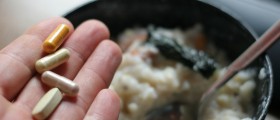
Psyllium husk is a fibrous supplement used to treat different health problems. It is also known by the name of isabgol, and it is native to India. Psyllium husk is obtained from the seeds of the plant called plantago ovata.
This supplement is one of the best natural sources of dietary fiber. Only one third of a cup of psyllium husk provides as much as 71 grams of fiber. It is a water-soluble indigestible fiber, which means that it promotes healthy bowels and enables proper functioning of the gastrointestinal system. It helps with conditions like obesity, high cholesterol, diabetes and it helps in weight loss, but it also has some negative side effects.
Health benefits of psyllium husk
The main benefits of psyllium husk derive from the fact it is so rich in fiber. It contains both soluble and insoluble fibers and the two have different effects.
One of the major benefits of this supplement is its effect on the bowels. If used regularly, psyllium husk has a laxative effect that is mild and natural, and does not cause addiction, psychological or physiological. This makes it a perfect solution for constipation, as well as a means of prevention.
Psyllium husk also promotes the growth of friendly and beneficial bacteria that inhabit the intestine, enhance the digestion and increase the absorption of important nutrients.
Psyllium husk powder is beneficial for diarrhea too, because it absorbs the water as it becomes bulk.
Although in some cases it can worsen the condition, psyllium husk is widely used as a cure for irritable bowel syndrome.
Regular intake of psyllium husk for eight weeks minimum reduces the levels of LDL, known as bad cholesterol.
This supplement can also be used as an aid in weight loss. It absorbs water and if taken 30 minutes before meals, it reduces the appetite.
Even people who have anal fissures doe to constipation and irritable bowel syndrome can benefit from psyllium husk.
In addition, it is believed that psyllium husk prevents colon cancer and regulates hormone balance.
Side effects of psyllium husk
While it has many beneficial properties, psyllium husk has also been reported to cause certain negative side effects on some people.
For example, some people are allergic to it. The allergic reaction may include rash, wheezing, coughing, vomiting, hives and difficulty breathing.
Psyllium husk is not recommended for people who have or have had serious bowel problems, as this supplement can actually aggravate their condition. The same goes for people who have underwent a bowel surgery.
Psyllium husk must always be taken with water; otherwise it may expand in the throat and cause irritation or even choking.
Also, it is not recommended to take psyllium husk along with laxatives, since the two do not react well. It should always be consumed at least two or three hours before the intake of prescription drugs.
Psyllium husk is not recommended for pregnant women and for children.

















Your thoughts on this
Loading...